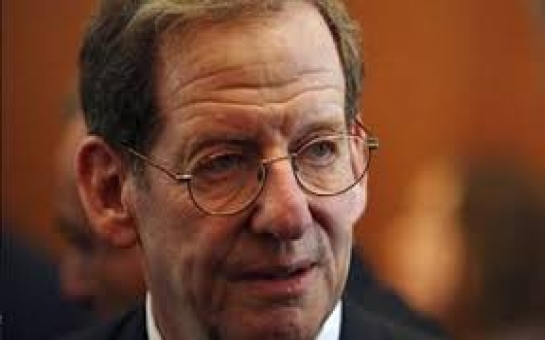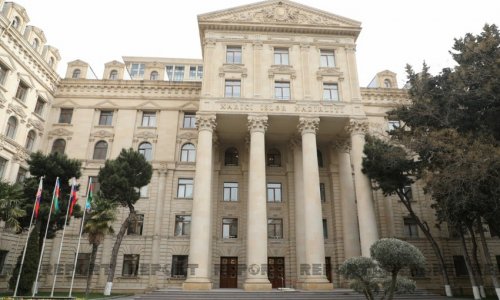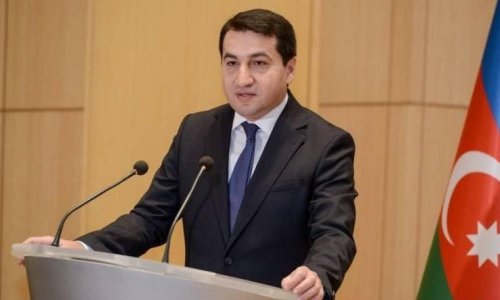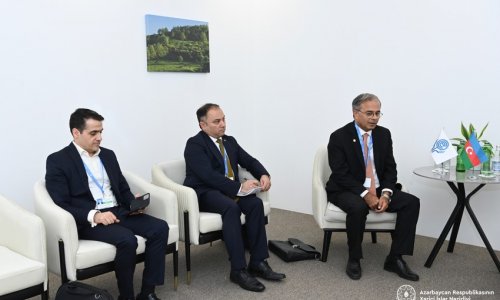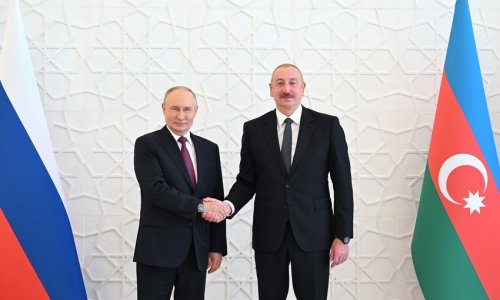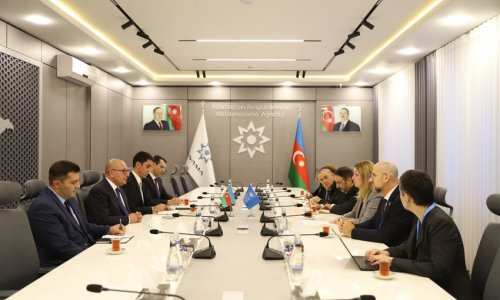With Baku now taking over the chairmanship of the Council of Europe, U.S. Ambassador to Azerbaijan Richard Morningstar talked to Khadija Ismayilova from RFE/RL's Azerbaijani Service about what the Caucasus country could achieve at the helm of the human rights body. He also discussed other pertinent issues, such as Nagorno-Karabakh and possible fallout from the ongoing Ukraine crisis.
What would you call the success rate within the six months of [Azerbaijan's] chairmanship [of the Council of Europe]? What would happen to let you tell that it was successful?
Richard Morningstar: Well, there are trials that are going on now -- and appeals. We've certainly been troubled by some of those trials -- some of the verdicts have not been reached. I think fair results with respect to some of those trials and appeals would show progress. I think that fewer attacks on journalists during the period would show progress. I think the reopening of the civil society dialogue would show progress.
A couple years ago, after one of [U. S. Secretary of State Hillary] Clinton's visits, the government agreed to hold a civil society dialogue. I think there was one session and there has not been one since then. I think that would help. There seems to be a huge amount of pressure right now on international NGOs that are working with respect to civil society -- investigations by the Tax Ministry, by the Justice Ministry...
Again, I don't understand why these investigations are taking place other than to harass these organizations and the people who work for them. Lightening up on that, I think, would show progress. Freedom of assembly is part of the action plan. There was some freedom of assembly during the elections. Hopefully there will be less problems as far as that goes...
Are there countries where the United States is able to do more and this is just the reality for Azerbaijan?
Morningstar: It's hard for me to compare Azerbaijan to what we are doing in other countries because I am not directly involved in those countries. There are clearly problems here. I think there are worse countries. This is clearly not the worst country, but there are plenty of countries that are doing better.
And one of the things that the government needs to consider is that -- what makes Azerbaijan somewhat different from some of the other countries -- Azerbaijan presents itself as a democracy. And there are worse countries. I want to be totally clear on that. But if Azerbaijan is presenting itself as a democracy, than it means to me that Azerbaijan has the responsibility to ensure that some of the things that have been happening here don't take place.
Ismayilova and Morningstar then discussed a recent satirical sketch in Azerbaijan that poked fun at some the diplomatic language -- such as the word "concerned" -- which the United States has used to describe the human rights situation in the Caucasus country.
Morningstar: I would ask you: What words are we supposed to use? Am I supposed to say, "Azerbaijan is a horrible place for doing these terrible unacceptable things, and it is going to ruin the relationship with the United States!" Is that what I'm supposed to say? I think that we do a good job at making clear how -- I want to say "concerned!" -- how deeply disturbed we are by the events that are taking place, and we make it very clear to the government. And I think, incrementally, we've done some good with respect to certain cases.
At the same time, I don't think it is in Azerbaijan's interest or in its civil society's interest or individual Azerbaijanis' interest that we say, "We don't like what you are doing, so we are going to walk away from Azerbaijan," or, "We are going to make things so difficult for you on the human rights questions that we recognize that we aren't just going to be able to deal with you." I think that would be bad for Azerbaijan. Who else is going to speak up for Azerbaijan sovereignty and independence vis-a-vis Russia -- particularly after Ukraine? Who else is going to be a buffer to make sure that the Nagorno-Karabakh negotiations are fair or don't go in an unfairly bad direction. Who else is going to work with Azerbaijan on...counterterrorism problems?
I know that people think we care too much about energy. Yeah, we care about energy, but we are not going to see any Azerbaijani oil or gas -- but we do think it's important as a counter to Russian monopolization in some places. If we just didn't care and walked away, I don't think that would be very helpful either. There has to be some kind of balance. I know that many -- yourself included -- wish that we would do more, but we do the best we can under the circumstances and I think we have actually spoken out more in the last couple of years than ever has been the case in the past on human rights issues
Since you mentioned Ukraine...Has the Ukraine crisis affected the United States' views on the Nagorno-Karabakh issue? Has it changed?
Morningstar: Not on the substance. It's affected our views from the standpoint that we believe that it is even more important to resolve Nagorno-Karabakh -- it's always been important, but I think it's even more important now post-Ukraine crisis. It doesn't help Azerbaijan to have an area of instability -- meaning the whole Nagorno-Karabakh and the occupied territories surrounding Nagorno-Karabakh.
It doesn't help having that potentially explosive situation out there. Who knows -- after looking at what Russia has done with Crimea and Ukraine -- who knows whether Russia or a third party would take advantage of that situation? And it's important to get it resolved and we keep trying to emphasize that.
We emphasize another thing with respect to Ukraine, which is essentially what I said before -- that, given the situation now -- Azerbaijan and the U.S. both have to work to protect the relationship because -- as I said before -- who else is going to stand up for Azerbaijan's independence? The United States and Europe, basically. And I think that the government -- certainly many in the government, including the president -- recognize that the relationship with the U.S. is important.
I think one of the unfortunate things from Azerbaijan maybe, is that the government does not want to see anything happen here like what happened in Maidan Square, and that that... -- in some peoples' views -- ...might be giving them an excuse to crack down even harder with respect to human rights and democracy issues.
That's an unfortunate lesson from Ukraine, but I do sort of see a double track. "Yes, it's important to have a relationship with the United States given what's happened. On the other hand, we can never let that happen here," and that may be making it more difficult for civil society.
So in your view, there is another lesson that the government could take from Maidan?
Morningstar: My argument would be: I understand what you are saying, but if you take too hard a line and don't give enough breathing space to civil society, arguably, it's more likely that, at some point, there could be a real issue. It may not be today, but maybe 5 years from now, 10 years from now, or 20 years from now. But I think that's the risk if civil society is closed off too much.
One thing the Ukrainian crisis told the world is how corruption can bring down a state
Morningstar: That as well. Absolutely.
Do you take this issue up in your conversations with [President Ilham Aliyev]?
Morningstar: Sure.
Does he take these issues personally because his family is part of the corruption?
Morningstar: I believe he understands the necessity of diversifying the economy. The problem -- and I'm not going to say it's President Aliyev -- but the problem is that steps that need to be taken so that entrepreneurs who go into business have the incentive and feel that, as they grow and become more successful, that they will not be interfered with by monopolized sectors. And, when I talk to younger business people, I think they see it opening up some, but it still needs to open up a lot more.
We'll go back to the Nagorno-Karabakh issue. [OSCE Mink Group co-chair] James Warlick said there are six elements to achieve the peace there. Are they achievable?
Morningstar: It's achievable if the countries involved [Armenia and Azerbaijan] have the political will to achieve it. There are two key points, ultimately. It's a question for negotiation and how things are phased and how it gets accomplished, and I won't get into details, but there are seven occupied territories. They have to go back to Azerbaijan. And I think we should be loud and clear about that. And that's—
And that should be unconditional?
Morningstar: As part of the negotiations. But any settlement will require those seven territories to go back to Azerbaijan and I think that Jim Warlick made that clear and that's clearly our policy. Yes -- there could be a small corridor into Nagorno-Karabakh through Lachin. And that has to be negotiated.
And when I talk about the seven occupied territories, I differentiate Nagorno-Karabakh only because NK, as a result of the final status, has to be determined as a result of those negotiations.
And the sooner the two sides can get together and work out the concrete steps as to how to accomplish all of that… It's not as simple as I am saying. How many territories could come back first? What kind of security guarantees would there be? Then would you do Kelbajar next? When is there ultimately some kind of referendum or determination as to the final status of Nagorno-Karabakh? At what point and time?
All of these things have to be negotiated, but none of it can happen without the two countries and the two presidents being committed to resolve that. We're committed to help that happen. We cannot force the settlement. Russia also has to be committed for that to happen
But they can force it?
Morningstar: I don't know whether they can force it or not, but they could prevent it. It's a good question: If the two presidents finally decided "Ok this is the plan and we're going to carry it through," I don't know whether Russia could prevent that… I'm getting things a little circular… I guess what I'm trying to say is that I don't think Russia can force either Azerbaijan or Armenia to sign on the dotted line. They could threaten military force, but it would be difficult to do. Maybe, that they could not prevent it if the two presidents were really determined.
On the other hand, because of the pressure that they could put on both countries, maybe even more particularly on Armenia, if they decided to prevent it, there is a possibility that it could happen. It would be interesting to see if -- if the two presidents could ever come to an resolution -- whether Russia would try to prevent it or not.
The other question is: Is Russia totally satisfied with the status quo right now? Because, right now, Russia has leverage on both Armenia and Azerbaijan and maybe continues to have the most leverage if there continues to be no resolution.
I've heard people with a view that, Russia doesn't want war, they want no hostilities, but they may not want resolution, and I don't know. I think that, if the two presidents were to work together to try to reach a settlement, that it would test the Russians' resolve as to whether or not that would take place.
How do you see the post-Ukraine period? [How] do you see...the level of independence of Azerbaijan: Has it grown in the past one year or is Azerbaijan now less independent than it used to be before Ukraine?
Morningstar: I don't know if it is less independent. I don't think Azerbaijan's ability to conduct its own business in an independent way has changed much before and after the Ukraine situation. I think perhaps what's changed is the calculation as to risk, as to future interference with Azerbaijan. I'm not sure Azerbaijan has seen it yet. It could see it in the future. I think the Putin trip to Azerbaijan last summer was very interesting
It was before the elections...
Morningstar: It was before the elections. I think some read that trip to have shown Putin saying "Yes. We'd rather have President Aliyev than anyone else at this point." I think that trip could be interpreted to be saying "Ok. You're independent. Let's cooperate as much as we can, but we recognize your independence." I don't know.
Do you think Putin can give such reasonable messages? Like "We accept that you are independent?"
Morningstar: Maybe. I don't know. I'm just talking off the top of my head. Obviously, I'm not in Putin's mind. I was not part of those meetings. Do you think that either Iran or Russia would like to have common borders right now? In other words, if Russia were to -- I'm not predicting that this would ever happen -- but even if Russia had the possibility to bring Azerbaijan back into its fold, do Russia and Iran want to have the same border at this point?
I guess Azerbaijan should feel like a piece of paper between two blades of scissors...
Morningstar: And you're making the point that the government makes all the time. They use that as the argument to justify the need for stability.
...You have three months to go [in your stint as Ambassador]. Do you have some goals to achieve?
Morningstar: If I could wish for results between now and when I leave, it would be a greater understanding and appreciation between us as to the importance of the relationship-- which includes Azerbaijan's very brave maintenance of its independence. It includes cooperation in the areas that are in our common interests, but also that there be more of an understanding with Azerbaijan as to the need to open up society further to create greater stability and to avoid some of the unnecessary actions that again hurt individual people but that also create unnecessary irritants in the relationship because I can't understand any real benefit to some of the things that happen.
Bakudaily.az

